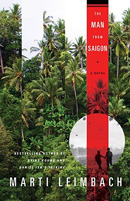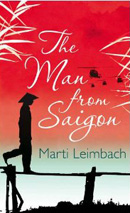


Nan A. Talese, hardcover, 9780385529860
HarperCollins (UK), paperback, 9780007305995
I was a child during the American war in Vietnam. I can still conjure images of the time: horrifying photos in Life magazine, correspondents on the nightly news reporting over the sound of mortar fire, while in the background medics bearing stretchers ran, crouching, toward waiting helicopters. Recently I decided to learn more. I read Vietnam memoirs and poetry from soldiers, nurses and journalists; I studied photographs and watched documentaries. I became immersed in the language of the war: hootches and Zippo raids, VC and ARVN, Bouncing Betty mines and Huey choppers.
And so I approached Marti Leimbach's novel The Man from Saigon with a bit of skepticism. How could a novel about Vietnam written 40 years later capture the heroism and horror, beauty and ugliness, good intentions and lunacy that I'd encountered in memoirs? My skepticism was entirely misplaced. Leimbach has done her research well. The Man from Saigon is beautifully written; it is honest, unflinching and deeply moving.
The novel centers around Susan Gifford, a writer for an American magazine who is sent to Vietnam to cover human interest stories. She expects never to leave the relative safety of Saigon, but is irresistibly drawn into the countryside for stories, hitching rides in Army jeeps and helicopters. While in the field, Susan meets Hoàng Van Son, a Vietnamese photographer who—unexpectedly—is fluent in English and French. When they again cross paths at a news briefing in Saigon, the two decide to form a partnership. Traveling together, Susan records interviews and keeps notes while Son takes pictures and acts as translator. Theirs is a close and trusting relationship that does not seem destined to become romantic or sexual.
The third main character is Susan's lover, Marc Davis, an American news correspondent who had been in-country for nearly two years before Susan arrives. Calm and in control, Marc nevertheless has been profoundly affected by the violence and inhumanity all around him. He urges Susan not to trust anyone, even Son, who is something of a mystery man. When the convoy in which Susan and Son are riding is ambushed and they are captured by the Vietcong, Marc is desperate to locate her. I could feel his rising frustration and despair as he tries to negotiate with military officers whose priorities do not include seeking "the whereabouts of pretty young lady reporters who venture where they should not be".
Throughout the book, the narrative alternates between current experiences and recollections of previous events. Past and present merge—one battle recalls another, a trip to a field hospital reflects the desperate conditions of hospitals visited previously—and this helps to create a three-dimensional sense of place. It seems as if Vietnam surrounds the reader, as well as the characters. I found the writing to be evocative and compelling. While Susan tramps painfully through the jungle on bleeding feet with her captors, I often felt I was traveling with her, witnessing her dread and fear, hunger and misery, and feeling the intense heat of the jungle. Leimbach writes honestly about ugliness and horror, but counters it with glimpses of beauty and humanity that persist despite the ravages of war.
Leimbach's compassion and concern for all of her characters, friends and enemies alike, shine through in this
tale of love and courage, betrayal and loyalty. The novel is ultimately about what it means to be human, and what
it is that binds people together in desperate circumstances. The Man From Saigon is a fine example of the
power of fiction to convey truth.
